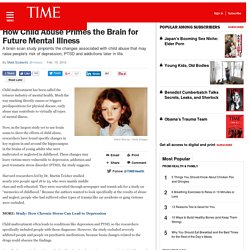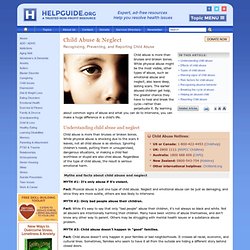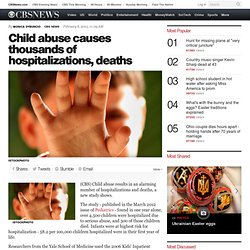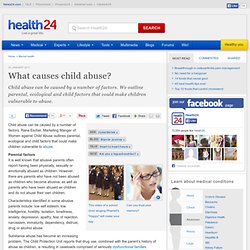

How Child Abuse Primes the Brain for Future Mental Illness. Child maltreatment has been called the tobacco industry of mental health.

Much the way smoking directly causes or triggers predispositions for physical disease, early abuse may contribute to virtually all types of mental illness. Now, in the largest study yet to use brain scans to show the effects of child abuse, researchers have found specific changes in key regions in and around the hippocampus in the brains of young adults who were maltreated or neglected in childhood.
These changes may leave victims more vulnerable to depression, addiction and post-traumatic stress disorder (PTSD), the study suggests. Harvard researchers led by Dr. Martin Teicher studied nearly 200 people aged 18 to 25, who were mainly middle class and well-educated. MORE: Study: How Chronic Stress Can Lead to Depression Child maltreatment often leads to conditions like depression and PTSD, so the researchers specifically included people with those diagnoses.
MORE: Nurturing Moms May Boost Children’s Brain Growth. Child Abuse & Neglect: Recognizing, Preventing and Reporting Child Abuse. Understanding child abuse and neglect Child abuse is more than bruises or broken bones.

While physical abuse is shocking due to the scars it leaves, not all child abuse is as obvious. Ignoring children’s needs, putting them in unsupervised, dangerous situations, or making a child feel worthless or stupid are also child abuse. Regardless of the type of child abuse, the result is serious emotional harm. Myths and facts about child abuse and neglect MYTH #1: It's only abuse if it's violent. Fact: Physical abuse is just one type of child abuse. MYTH #2: Only bad people abuse their children. Fact: While it's easy to say that only "bad people" abuse their children, it's not always so black and white. MYTH #3: Child abuse doesn't happen in “good” families. Fact: Child abuse doesn't only happen in poor families or bad neighborhoods. MYTH #4: Most child abusers are strangers. Fact: While abuse by strangers does happen, most abusers are family members or others close to the family.
Child abuse causes thousands of hospitalizations, deaths - HealthPop. (CBS) Child abuse results in an alarming number of hospitalizations and deaths, a new study shows.

The study - published in the March 2012 issue of Pediatrics - found in one year alone, over 4,500 children were hospitalized due to serious abuse, and 300 of those children died. Infants were at highest risk for hospitalization - 58.2 per 100,000 children hospitalized were in their first year of life. Researchers from the Yale School of Medicine used the 2006 Kids' Inpatient Database from the Department of Health and Human Services to estimate the rate of hospitalizations due to serious physical abuse in children under 18 years of age. What constitutes child abuse? Doing something - or failing to do something - that results in harm to a child or puts a child at risk for harm. "These numbers are higher than the rate of sudden infant death syndrome (about 50, per 100,000 births), which is alarming," Dr.
Hospital costs for abused children totaled almost $74 million in a year. National Children's Alliance Digital Media Kit. What causes child abuse? Child abuse can be caused by a number of factors.

Rana Escher, Marketing Manger of Women against Child Abuse outlines parental, ecological and child factors that could make children vulnerable to abuse. Parental factors It is well known that abusive parents often report having been physically, sexually or emotionally abused as children. However, there are parents who have not been abused as children who become abusive, as well as parents who have been abused as children and do not abuse their own children.
Characteristics identified in some abusive parents include: low self esteem, low intelligence, hostility, isolation, loneliness, anxiety, depression, apathy, fear of rejection, narcissism, immaturity, dependency, distrust, drug or alcohol abuse. Substance abuse has become an increasing problem. Parents’ lack of knowledge of childhood development may result in unreasonable or unrealistic expectations.